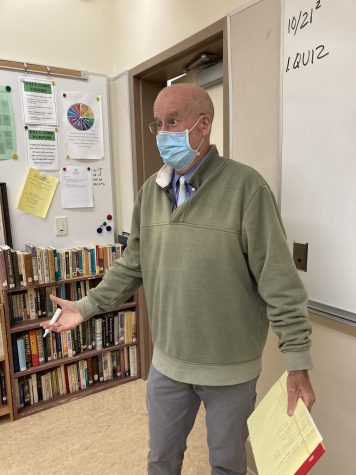Teachers say they were not consulted about district homework policy revisions
October 21, 2021
“Eleven days from when school began, we [teachers] got significant change on a number of [homework] issues without any consultation.”
That is how Palo Alto High School Advanced Placement United States History teacher John Bungarden characterized a series of revisions to the Palo Alto Unified School District’s homework policies approved by the Board of Education on Aug. 20.

According to a draft of the revisions reviewed by The Paly Voice, the modified homework policy mandated several existing recommendations — banning summer work and late work penalties — and prevented teachers from scheduling summative tests or assigning homework to be due on seven-period days. The modifications also reinforced existing guidelines for the hours of homework students should receive based on grade level.
When asked about who was involved in the revision process, Palo Alto Unified School District Director of Secondary Education Kathie Laurence named several district officials and bodies.
“Associate Superintendent Sharon Ofek and I were tasked with reviewing and revising the administrative regulations,” Laurence said. “It was then shared with the secondary principals, Superintendent and Executive Cabinet for feedback, revision, and ultimately, approval.”
Laurence also said the changes were made in coordination with the Palo Alto Educators Association, the district-wide educators’ union.
“The district works in partnership with PAEA and based on the conversation, AR 6154 [the homework policy] was revised,” Laurence said.
However, PAEA president Teri Baldwin said no conversations or consultations about the modifications have yet taken place.
“We did not have a part in writing the new AR [administrative regulation] and were not asked to consult on it,” Baldwin said. “When teachers had some concerns about the new homework restrictions added based on the new bell schedule, we brought those concerns to the district. We contacted Ms. Laurence to request that meeting and that has not happened yet.”
Art Spectrum and AP Art History teacher Sue La Fetra also said she was not aware of any discussions with teachers about the revisions.
“My understanding is that the school board or the district administration made changes without consulting teachers,” La Fetra said.
According to La Fetra, the revisions threaten to upend lesson planning for AP classes. She said the reinforced expectations for the number of homework hours are unworkable.
“For an AP class, those hours [expectations for hours] of homework a week are not feasible,” La Fetra said.
Bungarden raised similar concerns about the homework expectations.
“It [limits on hours of homework per class] seems unmoored in the realities of the classroom,” Bungarden said.
For Bungarden, the ban on summer reading also threatens to significantly disrupt his lesson planning, as summer work is an integral part of the course.
“We don’t get that head start because of the Board policy, at least we can’t require it [summer work],” Bungarden said. “It just means we are going to be a whole lot busier in the first three weeks than we are routinely.”
In addition to AP courses, summer work is a critical part of the Media Leadership and Management Honors course taken by the vast majority of seniors on Paly journalism publications. The revised policies provide no guidance or information to teachers whose classes currently include summer work.
According to La Fetra, there are starting to be discussions about the modified policies between teachers and the Paly administration.
“At this point, we are having a conversation with other teachers and with the principal to decide how we can do this or what we think of it [revised policies] and how this affects student learning,” La Fetra said.
Paly Principal Brent Kline said that these discussions about the value and goal of homework are crucial.
“As adults, we also need to have conversation and an agreed-upon understanding of what the purpose of homework is, why you assign homework, and how much it should be,” Kline said.
Bungarden said that teachers should have been at the center of those conversations to explain why they assign the homework they do.
“A much better process would have been for us to explain to whoever wants to know all the homework required for a given course,” Bungarden said. In this process, teachers would say “‘This is what I think it’s going to take: Some students will be more, some will be less.”
For Bungarden, the revision process was a missed opportunity.
“It may be that all the rationales that undergird the policies promulgated by the District compel; but that discussion never happened,” Bungarden said. “We weren’t asked; we were just told.”


